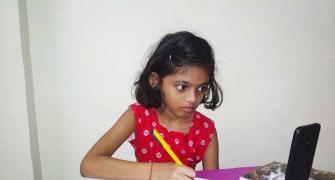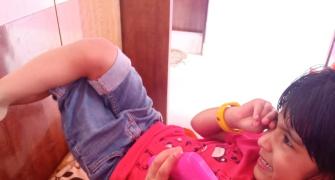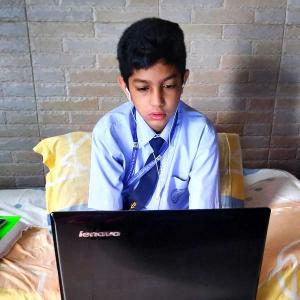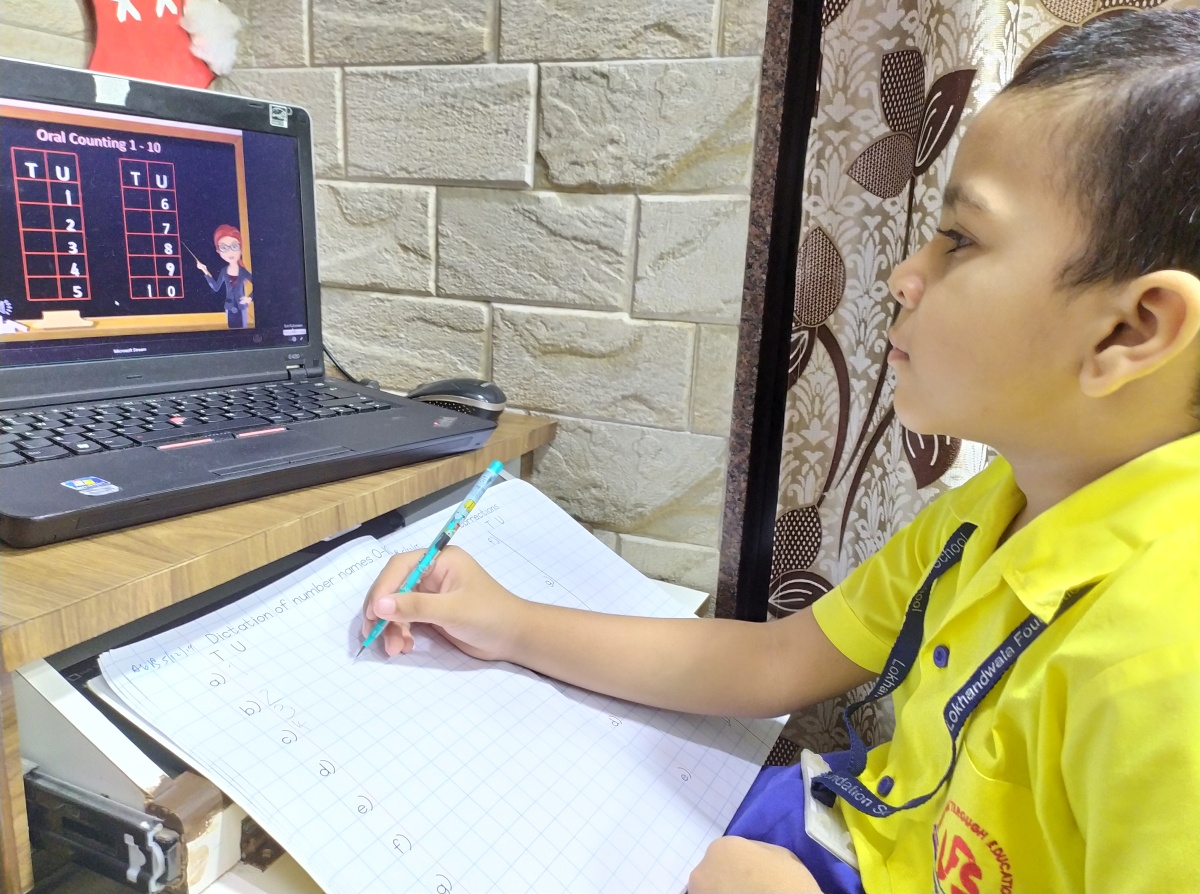Sneha Sundaram and Bharath Bevinahally tell us how Kutuki, an early learning app, will change the way 200 million Indian kids under the age of 7 will access education in the future.
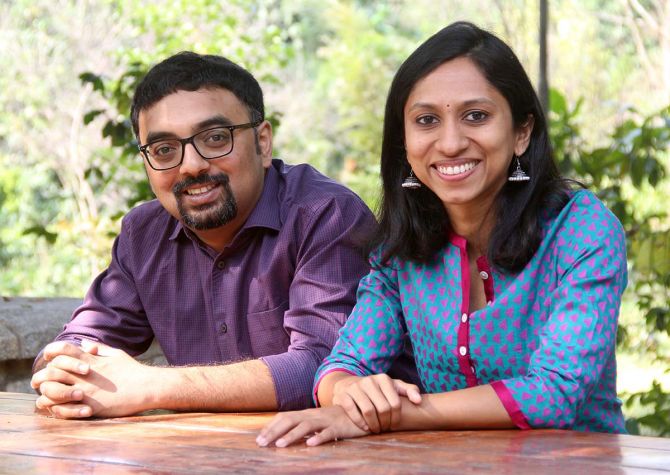
There are over 200 million children in India under the age of 7 years. And just about 40,000 pre-schools that cater to them.
Yet, majority of these children who live in tier 2 and 3 cities are unable to access good quality learning tools at the pre-school stage because there is no fixed curriculum. And whatever that is available, is either borrowed from the West or is too expensive.
"If there are 10 different pre-schools in a street, each of them will teach concepts differently. The concept, the style of teaching, the student-teacher ratio vastly varies in each school," says Sneha Sundaram, co-founder of Kutuki, an early learning mobile application.
"And when these kids join first grade, one kid may read a paragraph while the other may not even speak two words."
Kutuki, the brainchild of Bangalore-based couple Sneha Sundaram and Bharath Bevinahally, was recognised by Prime Minister Narendra Damodardas Modi in his Mann ki Baat address in August.
The early learning app that uses a proprietary story and song-based curriculum to attract youngest learners is one of the winners of AatmaNirbhar Bharat App Innovation Challenge.
Sneha Sundaram, an alumnus of the London School of Economics, tells Divya Nair/Rediff.com why she quit a corporate job to work with kids, moms and pre-school educators.
What inspired you to take the plunge from making music for corporates to working with kids?
Bharath and I both come from corporate backgrounds. I went to the London School of Economics and mastered in organisational psychology.
Bharath went to the Indian School of Business from where he did his MBA. Each of us were in different leadership positions in the corporate world.
We also happened to be professional musicians. I am a trained classical singer and Bharat plays the guitar and violin. He is also a producer.
A few years ago, we decided to quit our jobs and plunge into the world of music, primarily to make content for films, kids and public campaigns.
We did a bunch of things. That journey took us into the education space.
I have also worked with Teach for India so I was aware of the challenges faced by schools and educators.
When we started visiting these pre-schools, we realised that no innovation has taken place since decades. We are still singing the same old 'Ba Ba Black Sheep' 'Three Little Pigs', and narrating stories of Cinderella.
Our kids grow up watching videos of kids with blonde hair and blue eyes talking about artichokes, aubergine, ham and jam.
We use resources that are force-fit from the West, concepts which Indian students cannot understand or relate to.
So we decided to create audio-based conceptual content -- specifically for the Indian continent -- that is learning oriented. That experiment was a big success after which schools started reaching out to us saying they want to use our rhymes. That's when we realised there is a need for this.

What kind of research went into building Kutuki from scratch?
Our aim was to reach out to maximum kids, parents and teachers.
Bharath and I realised that the early education space and the challenges they face is grim in tier 2 and 3 cities where access to good pre-schools is not available.
There is a need and also a gap for meaningful contextual early learning education tool that is high on quality, is affordable and accessible to all.
This is a major challenge when they reach primary and secondary school. There are so many kids who find it hard to read a single sentence in English when they reach 1st and 2nd grade.
We were very clear that we wanted the app and its content to be accessible to mothers. And we wanted it to mobile-friendly.
The first place mothers look for content is on their mobile. So we stuck to a simple interface.
We brought together a team of educators, writers, artistes, and technology professionals and spent entire 2018 in research and putting the content together.
In January 2019, we launched Kutuki. On Kutuki, you will find illustrated e-books, animated rhymes, stories, lot of interactive content.
We used a proprietary contextual curriculum customised for Indian audience. We combined Montessori, multiple intelligence, etc to suit Indian kids.
We contacted 300 preschool teachers, we tweaked our content accordingly. Only after we were satisfied with the feedback, we launched Kutuki as a product.
How did you promote it?
Initially, we did music and story-telling workshops in Bangalore telling people about the philosophy of Kutuki.
It was mostly word of mouth. We started with English, then launched in Hindi. We saw more people downloading the Hindi version in tier 2 and 3 cities.
If you notice, most pre-school educators are moms, they are our cheerleaders. So they take it to schools and recommend it to others.
Kutuki is now available in Kannada, Tamil and Marathi.
Is Kutuki's content different in regional languages?
We don't do Google translate.
Our translators are native language speakers. We hired theatre artistes to co-create the content with us, so they could bring depth of emotion in the songs and stories, without essentially losing out the context and meaning.
What is your revenue model? How do you raise funds?
We were bootstrapped initially. Then we raised a pre-seed round from Jerry Rao, First Cheque and Better Capital so we are talking of approximately $200,000.
Today, we have more than 300,000 users and work with 130 preschools across the country.
Our subscription is very nominal. We have a 7 day trial period where you can access the entire library for free. After that, if you want to access, we have a couple of plans we keep experimenting with. So we have a 6 months and yearly plan which starts as low as Rs 4 a day.
What is the significance of the name Kutuki?
We wanted it to be Indian. We wanted it to be simple and playful, like it rolls on the tongue easily. That's why we picked this 3 syllable word.
Also it had to align with our vision and mission -- to ignite the curiosity of young minds. Kutuki comes from the Sanskrit word kautuka -- meaning curiosity.
We have these characters -- Kutu is an adventurous little boy. Ki is a curious little girl and there is Mintu, the haathi, a playful elephant. The three of them act as learning companions. So they do science experiments, learning activity around shapes with Indian sweets.

How has the response been so far?
We've had parents who have moved cities who realised how important it is to learn Hindi to survive, as a life skill. And some of them have been struggling because no matter what they tried, their child would just not learn the language.
So we've had parents tell us that the first Hindi word their kid learned was through Kutuki.
Conversely what we saw in non-English speaking towns is that parents want their child to learn English but they themselves don't know how to do it, because they can't speak English or know how to teach it to their children.
Since our content is available in a regional language, and also in English, these children first watch it in their mother tongue and then see it in English so they learn the words quickly. Their vocabulary has improved so much.
In a lot of households, it is the grandparents take care of their grandchildren while the parents are away. So, we've also had grandparents picking it up for their grandkids.
They enjoy learning shapes through bindis, counting with puris, and singing songs about their dada, dadi or thath-paati (grandparents). In the lockdown, it keeps the learning going now.
Do you notice any change in the number of learners or downloads during the lockdown?
Yes. Definitely. Although we have never really promoted the app so much, we have users in Patiala and smaller towns downloading the app and writing to us.
We even released a song called Corona se daro na to tell kids how they can maintain personal hygiene. It was released on Youtube in public interest. That song went viral.
It has been used by Child Relief and You, NITI Aayog and several schools across India to raise awareness about hygiene. People have called to tell us they saw it on Doordarshan. So many NGOs have also been using it. It's good to know about the outreach that our message has reached far and wide especially during the lockdown.
What were your thoughts when Prime Minister Modi spoke about your app in Mann ki Baat?
Ee didn't know it was happening. But it just validates the work we are doing.
It is only in 2019 that early learning was mentioned in the National Education Policy. Until then, it wasn't even an important part of the RTE.
Now am happy that pre-school education is finally getting the recognition it deserves. It's a big win for us, and the entire community of pre-school educators in the country.
What are some of your greatest learnings from this start-up?
We have realised that children in this age group do not listen or follow instructional mode of teaching like older kids do. So it is really important to have creative content that captivates them without forcing them.
What's next for you?
I think it is very important to structure early learning in India. Besides, a lot of pre-school teachers are overburdened because apart from teaching they are also responsible for the safety and security of the child.
These kids obviously have a mood and mind of their own. It's very time consuming and you have to be hands on.
We have to ease their burden by creating great educational aids that are ready to use and will take them lesser time to execute and implement at school. So they can focus on the joy of teaching.


